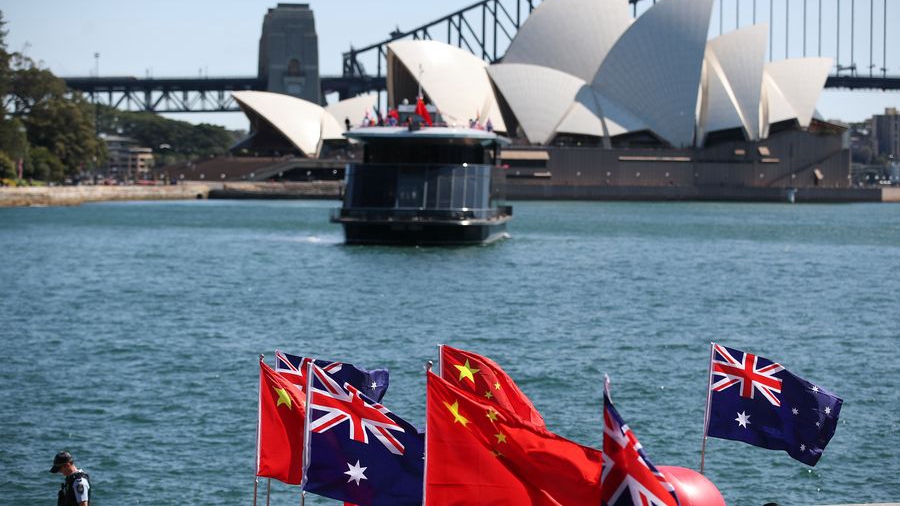Australia BRI reversal brings warning on ties
By KARL WILSON in Sydney and ZHOU JIN in Beijing | China Daily | Updated: 2021-04-23 07:20

Scrapping of deals invites harm, says Beijing, as it vows a firm response
China on Thursday urged Australia to rectify its wrong decision to cancel two cooperation deals between the state of Victoria and China under the Belt and Road Initiative, and has vowed to make a firm response to the move.
China is dissatisfied with Australia's position and opposes its reversal of the deals, Foreign Ministry spokesman Wang Wenbin told a daily news conference. China has lodged stern representations with Australia, he added.
Australia's political maneuvering and unreasonable practice are vile in nature in trying to reverse the direction of the wheel of history. The government's decision has also undermined confidence in bilateral local cooperation, and harmed the country's credibility, Wang said.
"While repeatedly saying it hopes to cooperate with China and strengthen high-level dialogue, Australia repeatedly is doing the opposite to damage bilateral relations," he said, adding that the latest move once again shows that the country has no sincerity in improving bilateral relations.
Beijing demands that Canberra stop making irresponsible remarks and actions regarding bilateral ties, and that it refrain from arbitrarily restricting normal cooperation and communication between the two countries, he said.
The Chinese embassy in Canberra said in a statement that the Australian government's decision to cancel the Victorian state government's agreements with Beijing will do more harm to bilateral relations.
"It is bound to bring further damage to bilateral relations and (the country) will only end up hurting itself," the statement said.
Australian Foreign Minister Marise Payne on Wednesday announced that the federal government had terminated the two BRI agreements between the Victorian state government and Beijing.
The embassy statement said:"The BRI is an initiative for economic cooperation, which follows the principle of extensive consultation, joint contribution and shared benefits, and upholds the spirit of openness, inclusiveness and transparency. It has brought tangible benefits to the participating parties. The BRI cooperation between China and the Victoria state is conducive to deepening economic and trade relations between the two sides, and will promote economic growth and the well-being of the people of Victoria."
The agreements were canceled under Australia's Foreign Arrangements Scheme, which has been in operation since Dec 10, 2020.
Under the scheme, the federal government has the right to cancel any agreement with a foreign country that it does not deem to be in the national interest.
An agreement between the Victorian government and Iran and another between the Victorian government and Syria were also scrapped.
In her statement, Payne said: "I consider these four arrangements to be inconsistent with Australia's foreign policy or adverse to our foreign relations in line with the relevant test in Australia's Foreign Relations Act."
Confrontational approach
Professor James Laurenceson, director of the Australia-China Relations Institute at the University of Technology Sydney, said the government's decision to terminate the two Chinese agreements with the Victorian government "were not unexpected".
He said the fact the Iranian and Syrian agreements were "thrown in was an attempt to dilute any suspicion that this was aimed solely at China".
"I think what this has shown is that Canberra really doesn't care about its relationship with Beijing. If it (Canberra) did, it would have allowed the two agreements to come to an end and then simply not allow them to be renewed," he said.
"That would have been the diplomatic and pragmatic way of doing things, rather than take a confrontational approach."
The BRI is a massive network of infrastructure projects-including ports, pipelines, railways and highways-stretching from Asia to Europe and beyond.
Speaking on ABC Radio on Thursday, Payne defended the government's decision and said she did not expect China to retaliate through measures such as trade sanctions.
"I think Australia is acting in our national interest. We are very careful and very considered in that approach," she told the ABC current affairs program AM.
"And it isn't about any one country, (and) most certainly not intended to harm Australia's relationships with any countries."
A Victorian government spokeswoman said: "The Foreign Relations Act is entirely a matter for the Commonwealth government."
























